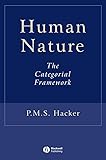Human Nature The Categorial Framework
Material type: TextPublication details: United Kingdom Blackwell Publishig 2007Description: 326pISBN:
TextPublication details: United Kingdom Blackwell Publishig 2007Description: 326pISBN: - 9781405147286
- N35.1 H115
| Item type | Current library | Call number | Status | Date due | Barcode | |
|---|---|---|---|---|---|---|
 Books
Books
|
DVK Library Stack -> Second Floor -> N | N35.1 H115 (Browse shelf(Opens below)) | Available | 11046174 |
includes index and biblioraphy
Chapter 1 The Project 1 1. Human nature 1 2. Philosophical anthropology 4 3. Grammatical investigation 7 4. Philosophical investigation 11 5. Philosophy and `mere words` 14 6. A challenge to the autonomy of the philosophical enterprise: Quine 17 7. The Platonic and Aristotelian traditions in philosophical anthropology 21 Chapter 2 Substance 29 1. Substances: things 29 2. Substances: stuffs 34 3. Substance-referring expressions 37 4. Conceptual connections between things and stuffs 42 5. Substances and their substantial parts 44 6. Substances conceived as natural kinds 45 7. Substances conceived as a common logico-linguistic category 49 8. A historical digression: misconceptions of the category of substance 51 Chapter 3 Causation 57 1. Causation: Humean, neo-Humean and anti-Humean 57 2. On causal necessity 62 3. Event causation is not a prototype 65 4. The inadequacy of Hume`s analysis: observability,spatio-temporal relations and regularity 69 5. The flaw in the early modern debate 73 6. Agent causation as prototype 75 7. Agent causation is only a prototype 80 8. Event causation and other centres of variation 82 9. Overview 88 Chapter 4 Powers 90 1. Possibility 90 2. Powers of the inanimate 93 3. Active and passive powers of the inanimate 96 4. Power and its actualization 98 5. Power and its vehicle 103 6. First- and second-order powers; loss of power 105 7. Human powers: basic distinctions 106 8. Human powers: further distinctions 114 9. Dispositions 118 Chapter 5 Agency 122 1. Inanimate agents 122 2. Inanimate needs 128 3. Animate agents: needs and wants 130 4. Volitional agency: preliminaries 137 5. Doings, acts and actions 140 6. Human agency and action 144 7. A historical overview 146 8. Human action as agential causation of movement 153 Chapter 6 Teleology and Teleological Explanation 161 1. Teleology and purpose 161 2. What things have a purpose? 169 3. Purpose and axiology 175 4. The beneficial 180 5. A historical digression: teleology and causality 181 Chapter 7 Reasons and Explanation of Human Action 1. Rationality and reasonableness 2. Reason, reasoning and reasons 3. Explaining human behaviour 4. Explanation in terms of agential reasons 5. Causal mythologies Chapter 8 The Mind 1. Homo loquens 2. The Cartesian mind 3. The nature of the mind Chapter 9 The Self and the Body 1. The emergence of the philosophers` self 2. The illusion of the philosophers` self 3. The body 4. The relationship between human beings and their bodies Chapter 10 The Person 285 1. The emergence of the concept 285 2. An unholy trinity: Descartes, Locke and Hume 289 3. Changing bodies and switching brains: puzzle cases and red herrings 301 4. The concept of a person 310
There are no comments on this title.
